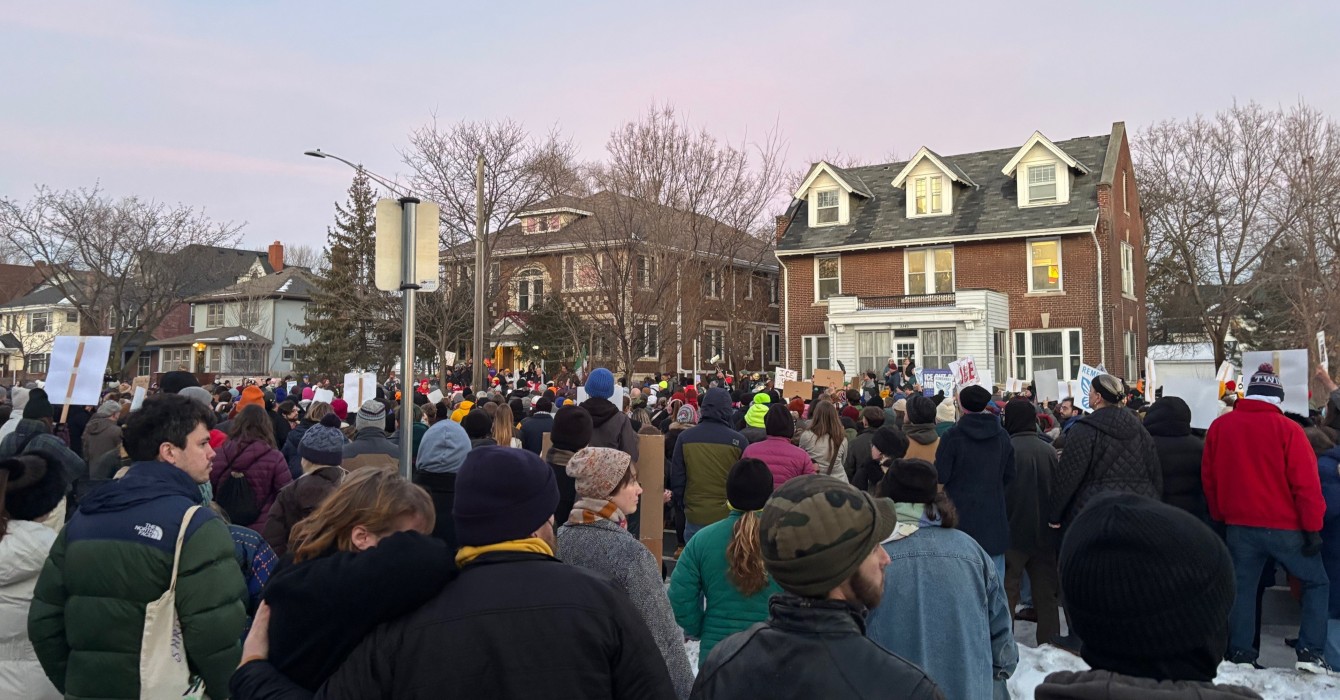An awed hush settles among the rapt audience at the Edward Jones Dome in St. Louis, Missouri.
A young African-American man is furiously tap dancing against a projected backdrop of slums and favelas. A spoken word resounds overhead with a paraphrase of the opening verses of John 1: The Word was with God, and the Word was God. Joyful and free, his performance is an exhilarating embodiment of the text. For a moment, we are treated to a picture -- one that gestures towards the beauty of the incarnation in the person Jesus.
The occasion is Urbana 09, a triennial student missions conference hosted by InterVarsity Christian Fellowship. Nearly 17,000 students from over 100 countries have gathered in downtown St. Louis to worship, learn and to engage with the conference theme, “He Dwelled Among Us.”
Following the stirring performance, Ramez Atallah, general secretary of the Bible Society of Egypt, assumes the podium. He relates the story of a wealthy missionary couple that moved into a Cairo shantytown, a community of the urban poor built on a landfill. Atallah observes that this points back to God’s assumption of humanity. The incarnation, he concludes, means that “God moved into our neighborhood” through Jesus. It is a powerful model for Christian mission.
Lest talk of missions raise ugly memories of past imperialist errands to the wilderness, the incarnational model discussed here at Urbana sounds a strikingly different chord. In one session Rev. Oscar Muriu, a pastor from Nairobi, disabuses students of the perceived hipness often associated with living among the poor. He issues a bracing call for North Americans to divest themselves of their pat answers, savior complexes, and access to the West’s technological might to simply come and see what God is doing among oppressed peoples in contexts like his own.
Over the last few decades, InterVarsity has emerged as a curious minority report in North American evangelicalism. Through vibrant multiethnic campus ministries and an emphasis on racial reconciliation and cross-cultural missions, the organization has readily embraced the “new shape of world Christianity,” a global movement of largely non-white and dispossessed Christians painted in detail by scholars such as Philip Jenkins, Harvey Cox and Mark Noll.
Nowhere is this more apparent than here at Urbana. Since 1946, InterVarsity has invited evangelicalism’s leading lights to speak at Urbana, including luminaries such as John Stott and Billy Graham. But Urbana 09 doesn’t feel like the dog and pony show that characterizes many Christian mega-gatherings. With the exception of Christian activist Shane Claiborne, most of the plenary speakers on this roster are virtual unknowns to North American evangelicals. Moreover, nearly half of the conference’s registrants are non-white. These are instances of ethnic and cultural diversity that would be the envy of most mainline Protestant churches and seminaries.
An enlightened friend who abstained from this week’s proceedings remarked to me that an emphasis on multiethnicity and social justice represents a sort of namby-pamby do-goodism that he cannot respect. It’s a point worth considering. I don’t care much for sentimental idealism either.
But then I think of InterVarsity’s story as a historically white, evangelical campus ministry that later came to address racial injustice in the name of faithfulness rather than expedience. My mind turns to its international students who have risked their ties to family and friends because they came to faith in Christ through an event like Urbana. I think of the campus staff workers who tirelessly raise their support each year because of their love of the secular university and all its creatures. And most of all, I think of the many exceedingly bright students gathered in St. Louis this week -- future doctors, lawyers, academics and CEO’s -- who will renounce upward mobility and six-figure salaries to embody the Kingdom in urban slums and far-flung places.
Martyrdom follows incarnation. As Michael Gorman reminds us, Christians remember the first martyr Stephen on December 26, the day after we celebrate the Word who became flesh and dwelled among us. Because of what happens at Urbana, young Christians are forsaking their “limitless potential” to bear crosses instead.
And what could be a more radical idea than that?






